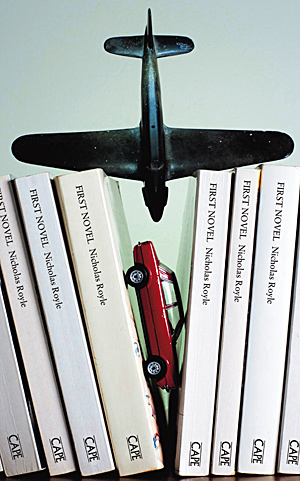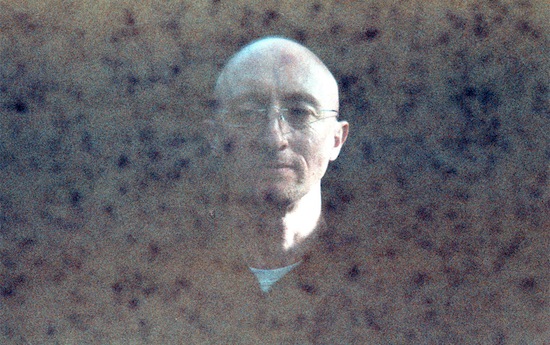Recently I caught up with author Nicholas Royle at his office at Manchester Metropolitan University, where he described his experiences in the publishing and film industries leading up to the printing of his latest novel, First Novel. In addition to writing, and teaching creative writing, Royle also edits fiction at Salt Publishing, working on about 4 novels a year. One of the novels he edited last year, Alison Moore’s The Lighthouse, was shortlisted for the 2012 Man Booker prize. Royle has been working on a new novel for about a year now, about haunting and still water.
‘My first novel was Counterparts and it was published in 1993 by a very small one-man operation called Barrington Books. It was a very, very strange novel. Two years later it was published as a paperback book by Penguin, which I found very exciting. It was also very satisfying because they had been among the publishers that I had sent it to in the first place. In fact three different editors at Penguin had rejected it. But when it got a couple nice reviews from the Barrington Books edition, Penguin became interested.
It’s about a man who mutilates himself. Looking back to it now, it’s full of elementary errors that I tell my students to avoid, like telling rather than showing. There’s all sorts of stuff in which probably the reader would think “Does this really fit in here? Does it buy its way in?” Probably not is the answer. It was what I wanted to do at the time. It’s what I could do; it was the best that I could do.
It reflected my interest in transgressive activities such as consensual self-mutilation and the mutilation of others. There was quite a thing about it at the time. RE/Search, an American publisher, did a book called Modern Primitives and there was also an American magazine called Piercing Fans International Quarterly that a writer called Clive Barker showed me. Clive had become a friend of mine because we had done a play together. I was in a play that he had written in 1983. He showed me this magazine and it was a sort of picture story of an Australian called Carl Carrol: he’d performed this extraordinary mutilation about himself, similar to the one that the character of Gargan in Counterparts does.
It struck me as a great metaphor for somebody with a divided personality. At the same time, I was fascinated by Eastern Europe and in particular by Berlin and the fact that Berlin was divided and that there was this wall running though it. People from one half of the city could go to the other but people from that half couldn’t go to the other. That struck me as a really good metaphor for split personality. It’s a novel about split personality and identity. Most of my stuff is about identity one way or another.
So, when Penguin bought the rights to do a paperback edition, they also said, “Let’s do a two book deal”. So I offered them my second novel, which is called Saxophone Dreams. They published that book, but not terribly well. It was not a very good book either, I don’t think.
After that came out in 1996, I left Penguin and my next novel, The Matter of the Heart , was published by Abacus. That was the novel that won the Bad Sex prize, which you might have heard of – it’s still given every year. Not everybody enjoys receiving it, but I did. It was enormous fun; it was a great party and you get a lot of attention. As a young writer who’s trying to get noticed you would be a fool, really, to turn that down.

For me Matter of the Heart was a bit of a departure in that it was historical and I’m not really fond of historical fiction: I never read it and I’d never written it before. But that was only one strand of the book… it was basically was about a room in a hotel that had previously been a hospital – kind of a haunted room. The book was all to do with hearts.
I did one more book with Abacus in 2000: The Director’s Cut. They called it a literary thriller. It’s a slightly uneasy genre that various publishers were trying to make work because there had been some books like Miss Smilla’s Feelings for Snow and one or two others that were considered literary novels but thrillers at the same time. So they would be published in B format, rather than the smaller A format which was traditionally associated with thrillers and genre books. It was a slightly uneasy… you know, some of these literary thrillers would sell and some wouldn’t. Mine did okay. It got reprinted, so it did better than they were anticipating, which was great. I sold the film option and was commissioned to write a script. It turned out to be the book I made the most money on because of that film, which never came out. But I was paid to write a script, and that was decent money because it was for a good production company. That was about five years, to-ing and fro-ing with this script. That’s what it’s like in film. Huge amounts of money are thrown around, some of it finds its way to writers and then scripts get written and never get filmed. It’s such a weird industry when you think about all the money that’s wasted.
However, it was very exciting for me – you know, the whole film thing. I was working with a producer called Jeremy Thomas who had produced some of my favourite films. Throughout the text I hide all the titles of films by a director called Nicolas Roeg; he’s my big hero in the world of film, and it was sort of an homage to him. A number of his films that he’d directed had been produced by this guy, Jeremy Thomas. Just to be sitting across a desk from him and talking about my script was like a dream come true for me because he’d worked with Roeg so many times; he’d made Roeg’s films happen. But Jeremy had decided not to produce this; he was going to direct it. He’d only directed one film before which was called All the Little Animals. It was a good film, I thought. He’d not directed for a long time; he’d just been producing and he was going to direct this. But, then in the end, it didn’t happen.
I wrote a sequel called Antwerp that was published by Serpent’s Tail in 2004. (If you want to read Antwerp and you’ve not read Director’s Cut or you don’t have a copy, you’re not missing anything.) Serpent’s Tail had a real reputation for cutting-edge, left-field, quirky fiction; that’s what they were known for.
Meanwhile, in 2003, I had moved from London to Manchester, which is where I was born and brought up. I started work here, at MMU, teaching creative writing. That interfered with my writing. My output became vastly reduced; I started writing much more slowly. So, whereas previously a novel would have taken me two to three years, this last one, First Novel, took six or seven years. But I’m very pleased with it, and in some way, I think it’s the best novel I’ve written. I think maybe it’s worth spending that much time on a book but I hope not to spend that long on the next one.
In the meantime, Serpent’s Tail had been bought by another independent called Profile, who although independent, were quite commercially-driven. When I submitted First Novel to them, my editor there who had always been supportive and who’d always liked my stuff said they’d find it hard to sell. The nature of what Serpent’s Tail were doing had started to change as result of them being bought up. They’d become, in my view, much less interesting. So they rejected it. My agent said, “Well, that’s fine, because I think we should be sending this to Cape.” And Cape loved it and said they wanted to do it.’
What is…
the one book you cannot live without?
JG Ballard’s The Complete Short Stories
your favourite city?
New York City
your most prized possession?
My dad’s hand-compiled ‘Tapes Index’ notebook detailing the contents of his reel-to-reel jazz recordings
your first memory?
The glass in the front door smashing over my head, requiring me to be stripped and stood in the bath and have water poured over me to find all the shards and pick them out
your favourite work of art?
Paul Delvaux’s Venus Asleep (or possibly Mike Nelson’s Coral Reef)
the one thing you cannot write without?
Music (ambient, electronic, drone, jazz etc… – instrumental)
your favourite magazine?
The Wire
the newspaper you read the most?
The Guardian
your greatest achievement so far?
Continuing to just about get away with it
the biggest lesson you would like your children to learn from you?
Honesty is best
your top advice to aspiring fiction writers?
Carry a notebook and pen
your favourite word?
Water meadow (and, if I can’t have that, cattle)
the word you wish was not part of your vocabulary?
I can’t write it down, but it’s one of a number of anatomical terms I would gladly see struck out of the dictionary

First Novel is available now, published by Jonathan Cape


